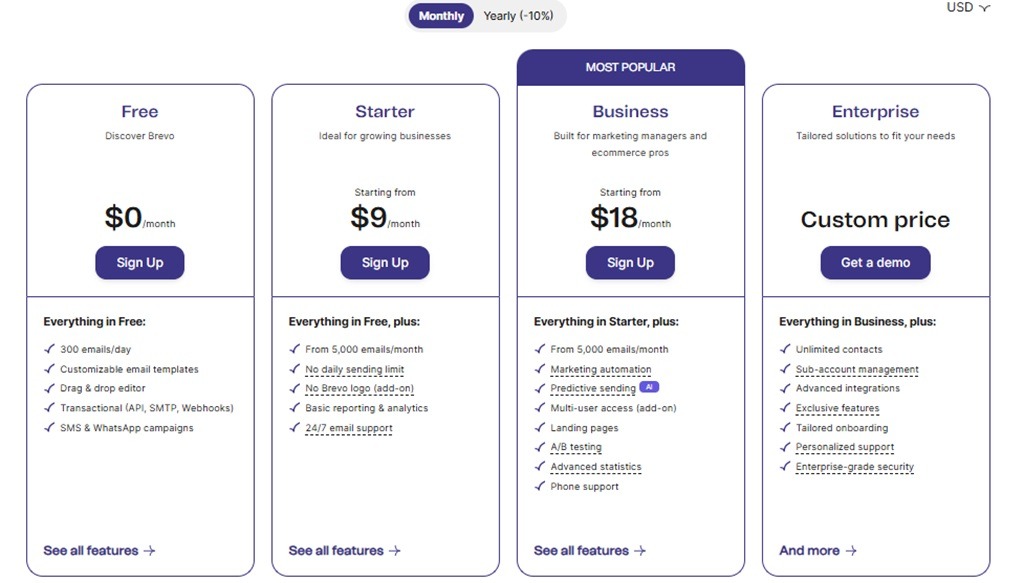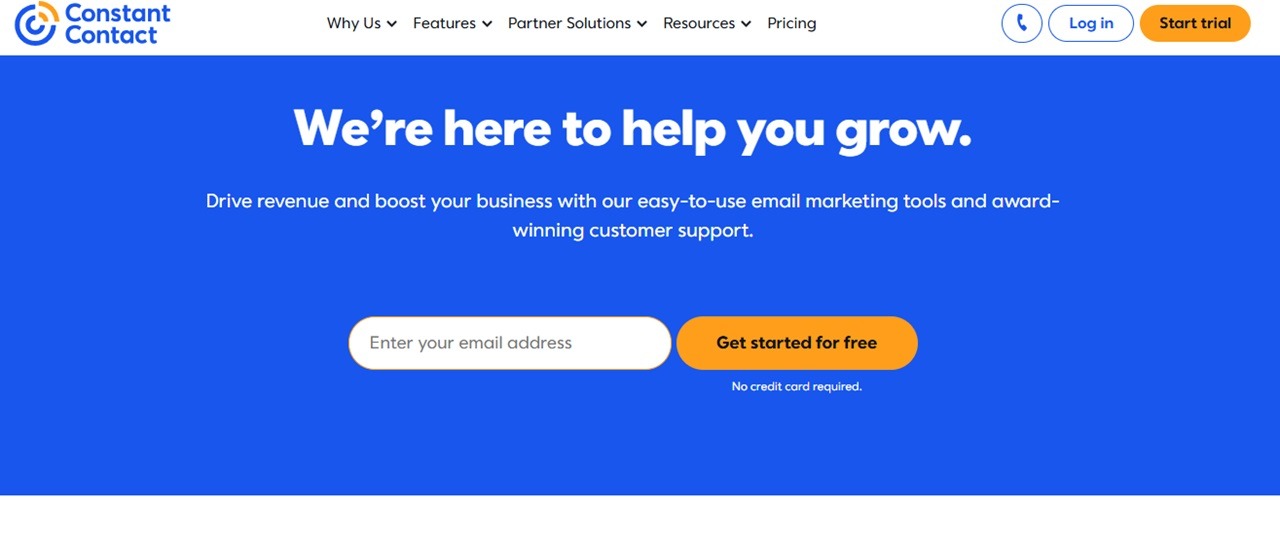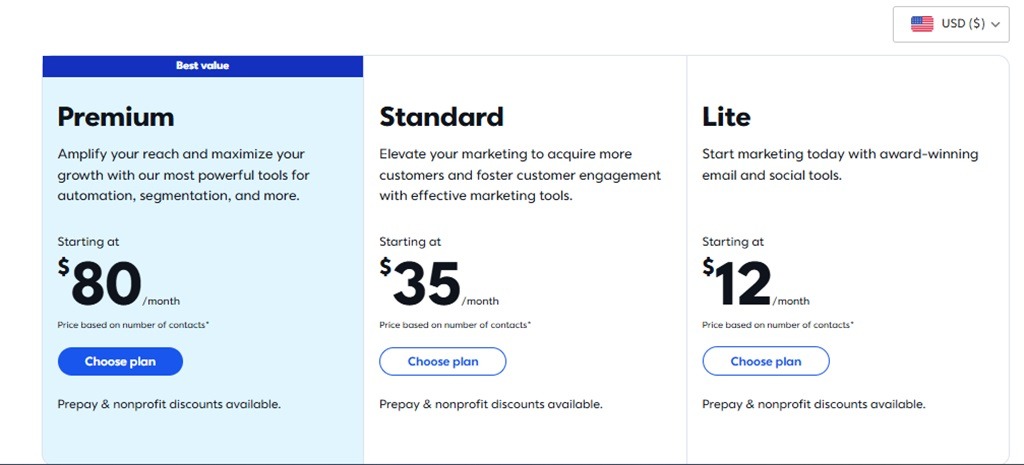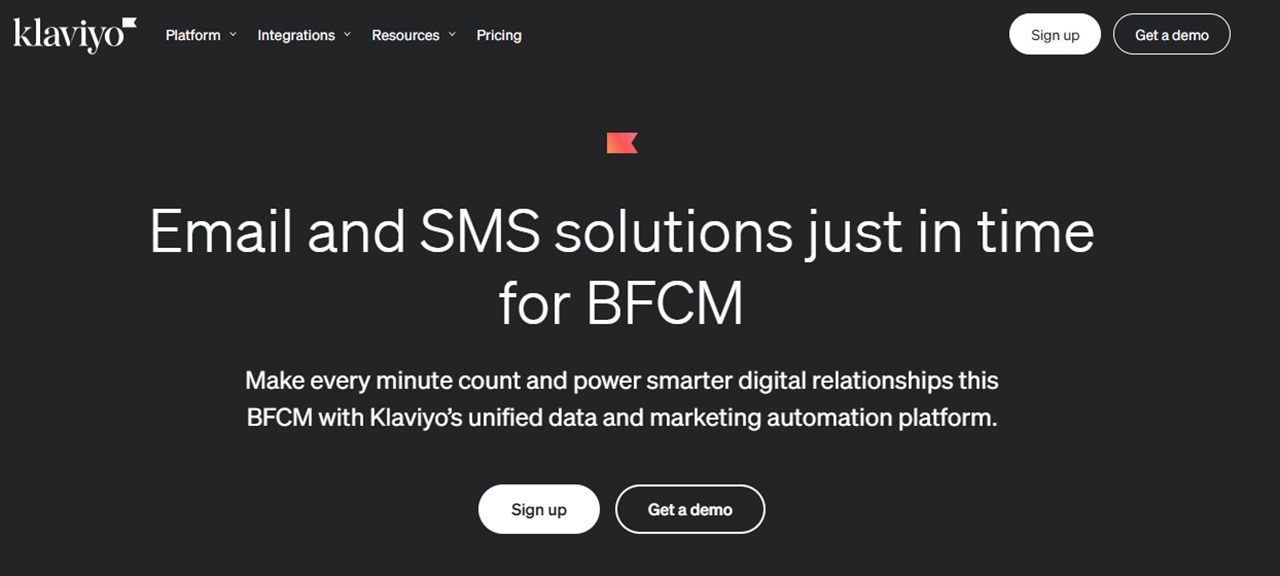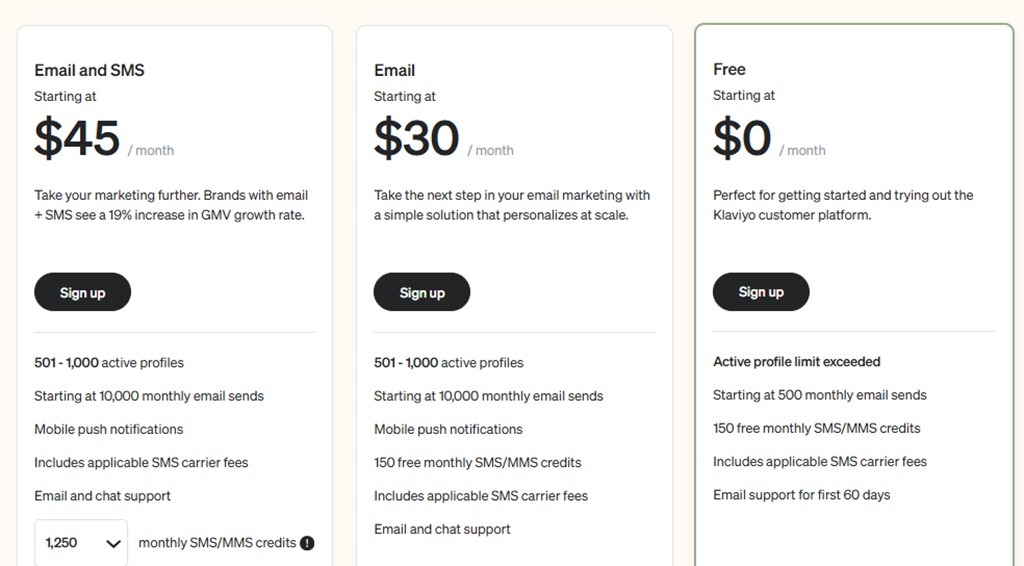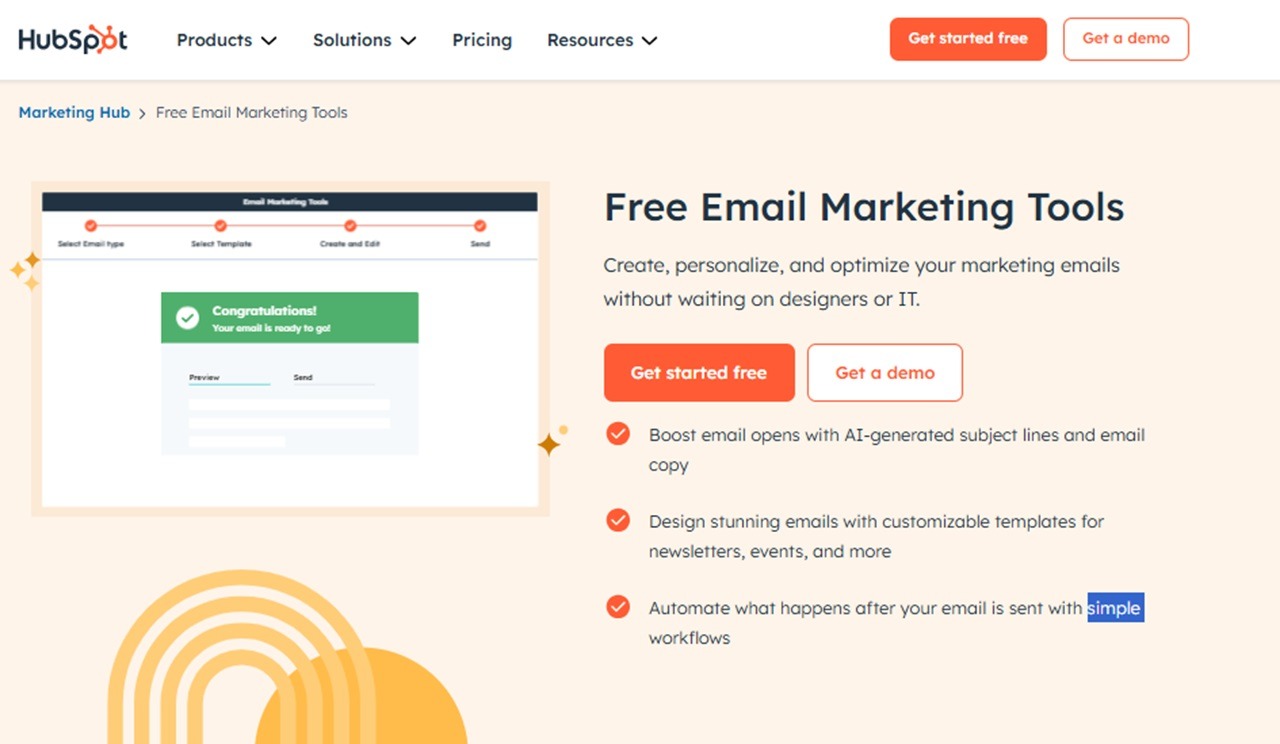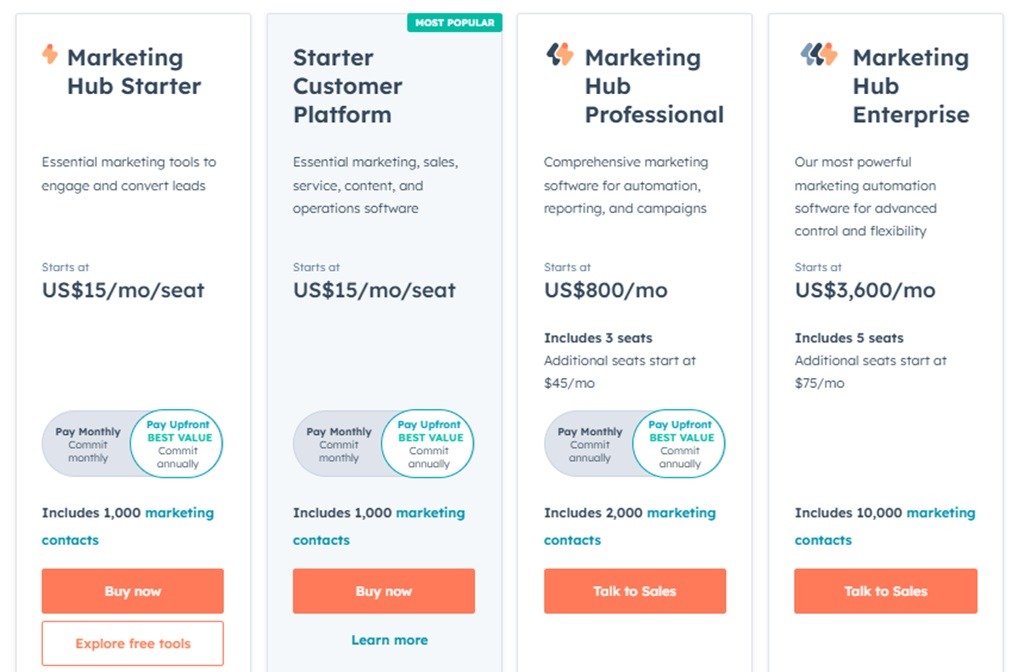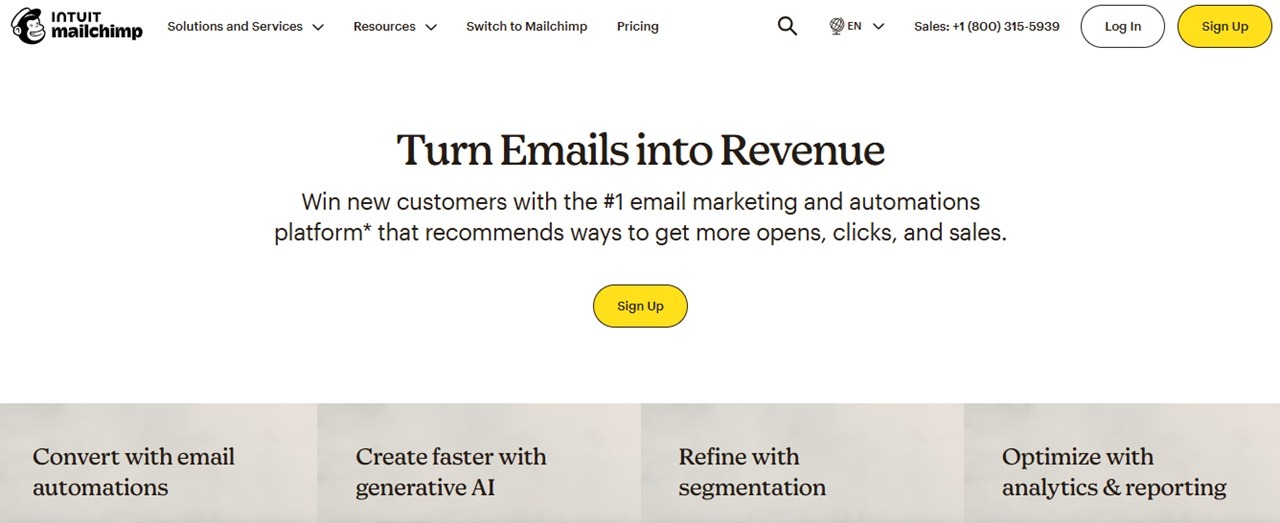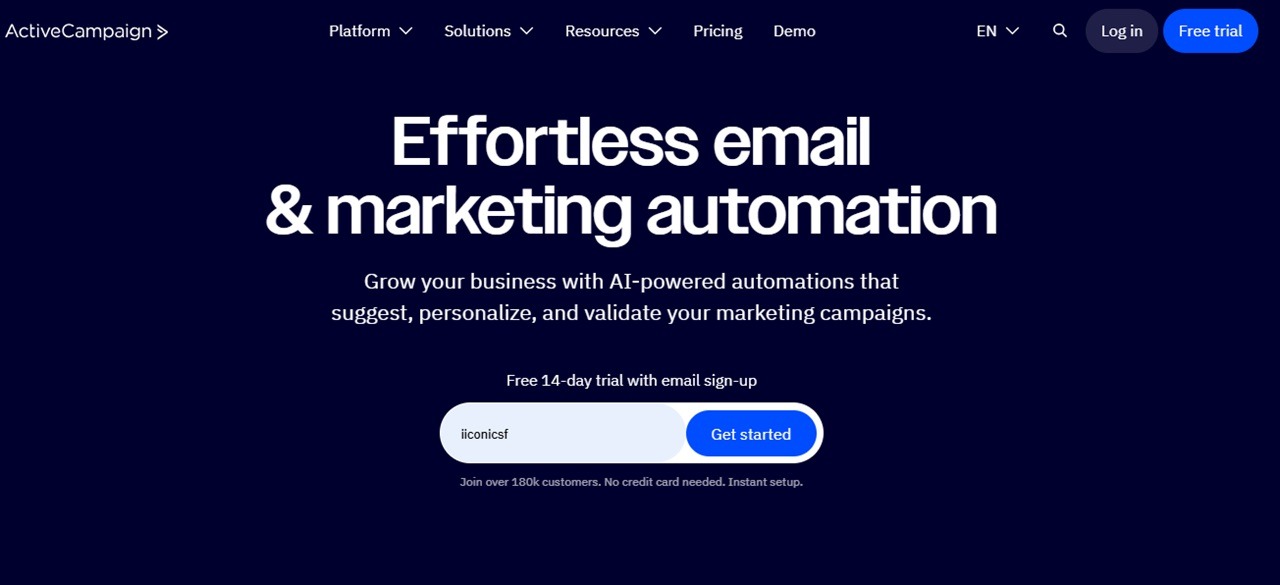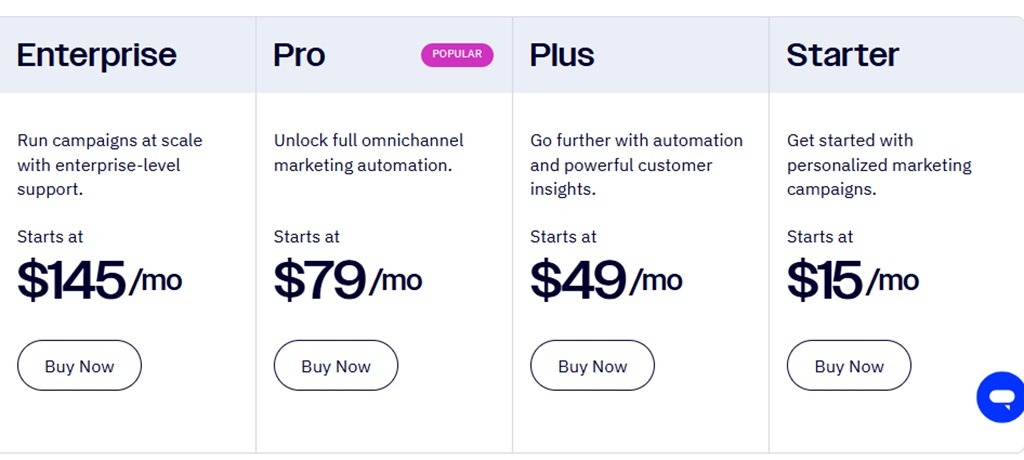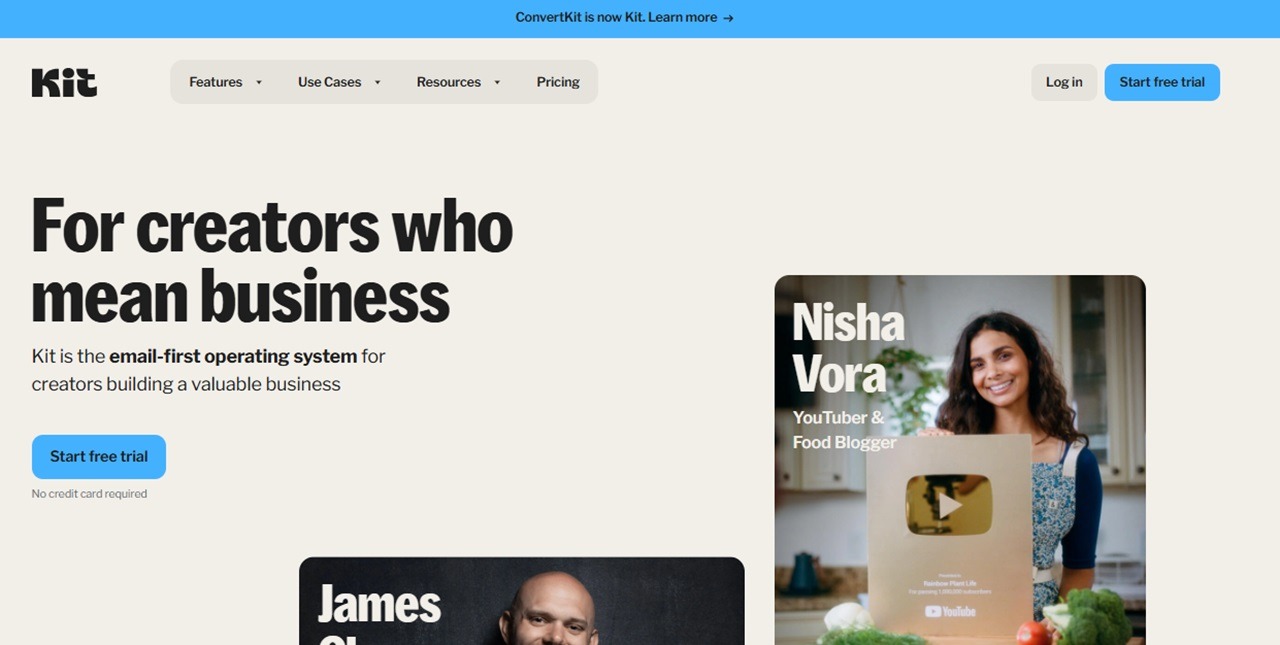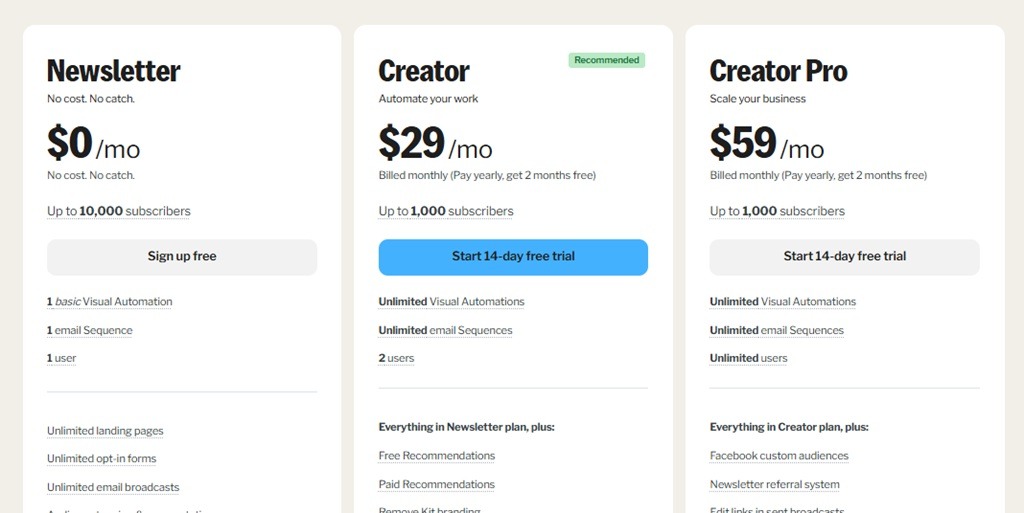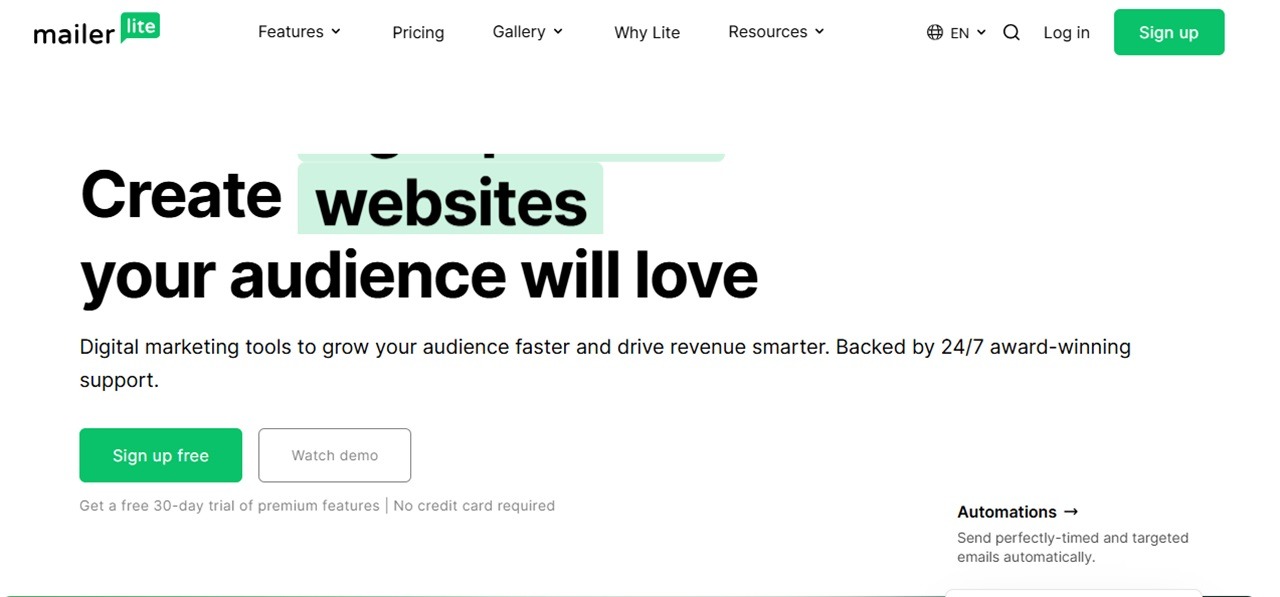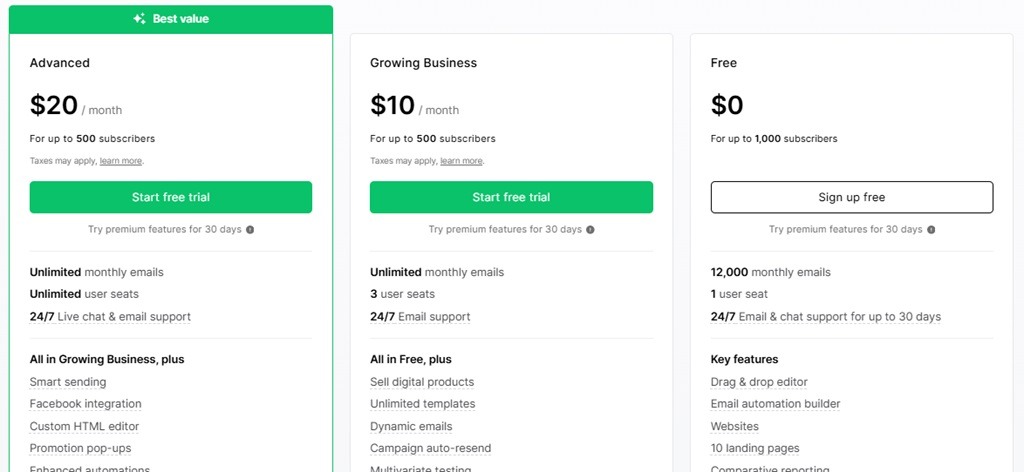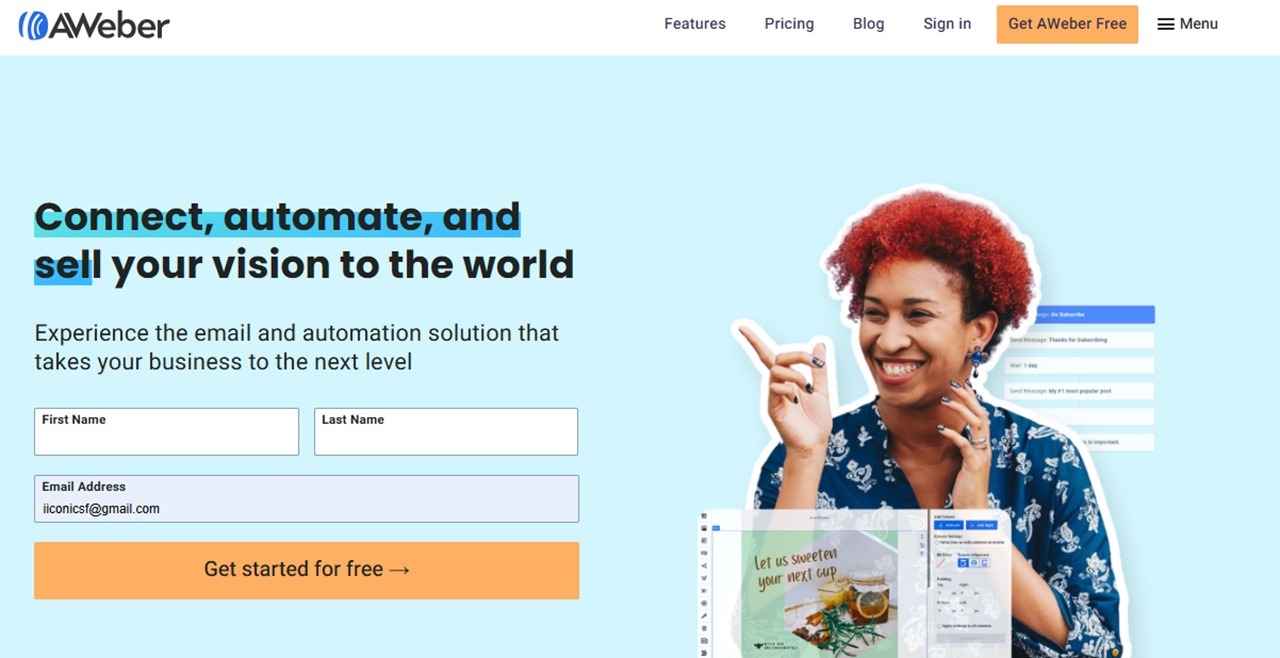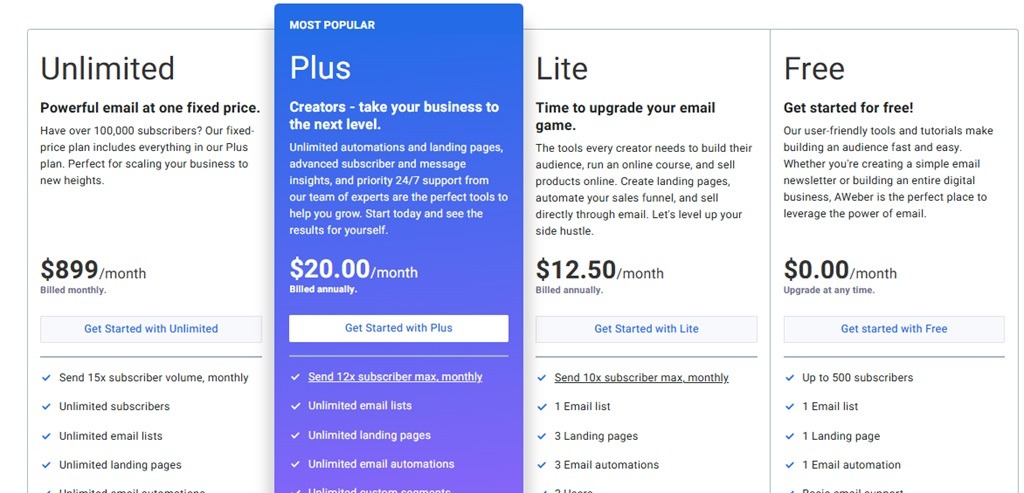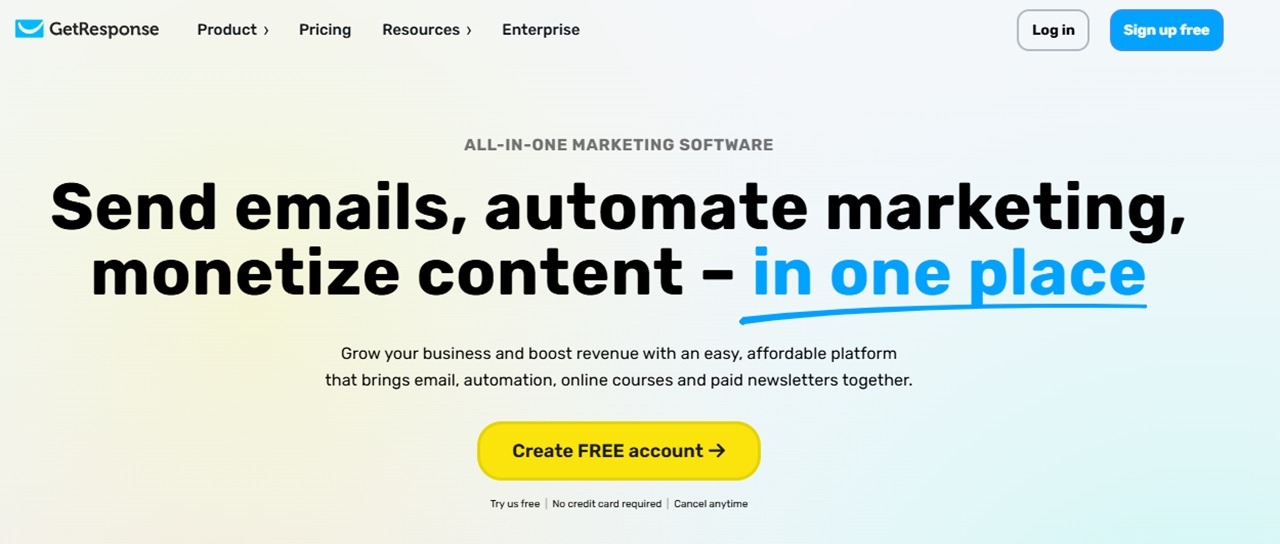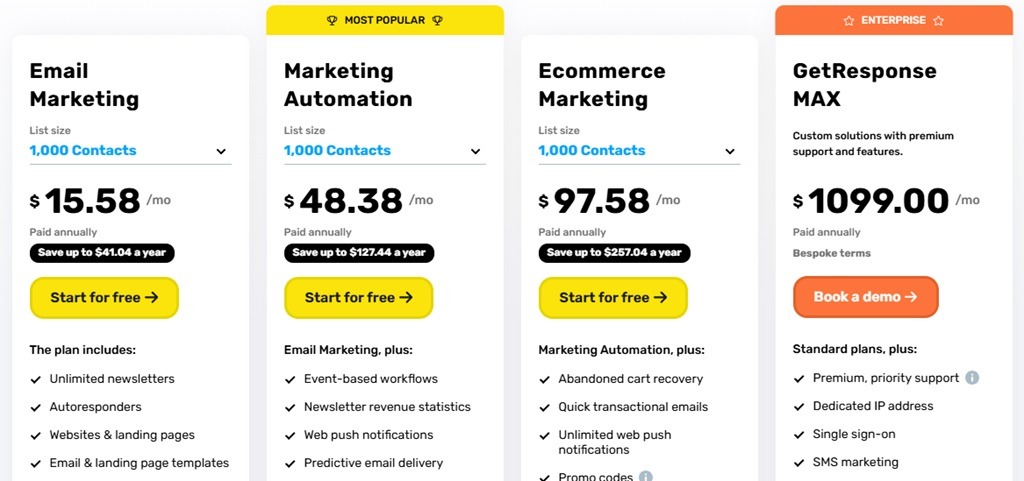Sending email campaigns and newsletters is easier with a marketing automation tool. However, how can you know which one to go for? So we decided to research and test the 10 best marketing automation platforms, software, and tools in 2024.
We assessed them based on their feature set, pricing, and user experience. While each had its unique selling point, Brevo stands out with its affordability and feature set.
We have evaluated email marketing software for years. Our goal is to offer accurate info to help you make informed decisions when picking one for your business.
Brevo is our pick because of its affordable entry plan pricing, user-friendliness, and omnichannel marketing. However, Brevo has pricey SMS carrier fees which is a drawback.
Evaluation Factors
Our professional team writes software reviews after thorough testing and using the tools. Our evaluations follow a set of criteria, and our goal is to provide genuine evaluations of all the software we review.
1. Brevo
Best Suited For: E-commerce businesses looking for software supporting transactional and trigger-based emails.
Pricing
Brevo’s pricing structure is simple. It offers four-tiered plans and a freemium package. The free package supports up to 300 daily emails and offers other entry-level tools.
Upgrading gives access to more capable features like a/b testing, among others. Billing is monthly or annual, with yearly pre-payments getting 10% off. Here are the plans:
Product Summary
Brevo goes beyond email marketing, offering support for transactional and trigger-based emails. It also provides a dedicated transactional section for capabilities like shipping updates, order confirmations, and more.
Brevo also excels at multi-channel marketing, supporting SMS, web push, and WhatsApp. Marketers can use one of these channels to target their segmented contact list for enhanced conversions.
Pros of Brevo
- Supports predictive email sending
- Offers a forever-free plan
- Provides low-cost plans
Cons of Brevo
- The free plan email send limit is low (300)
- Often has low email deliverability
- Phone support only on the top plans
Features
- A/B testing
- Transactional emails
- Advanced analytics
- SMS and WhatsApp campaigns
Recap
Brevo features suit e-commerce businesses looking for software supporting transactional and trigger-based emails. Its multichannel support, low-cost plans, and 150+ integrations make it stand out. Sign up for free or request a demo!
2. Constant Contact
Best Suited For: Businesses looking for a simple, proven platform for branding and email campaign building.
Pricing
Constant Contact lacks a free plan but offers three-tiered packages. Unlike most competitors, it offers a money-back guarantee and a 30-day free trial.
The plans are customizable, and the plan price depends on the subscriber number. Users can purchase add-ons like SMS credit and inbox preview. Here are the plans:
Product Summary
Event management is one of Constant Contact’s standout features. It allows users to create, promote, and manage their events from a central location.
Businesses can also integrate a payment gateway for payment collections. It provides the capability of selling tickets, event registrations, or invitations.
Pros of Constant Contact
- It has a high email deliverability
- Provides capable multi-channel marketing support
- Offers 300+ integrations
Cons of Constant Contact
- Lacks a forever-free plan
- Template customization flexibility is lacking
- Lacks unlimited email sends
Features
- Marketing CRM
- Event management
- SMS and Social media marketing
- 300+ integrations
Recap
Constant Contact suits businesses looking to improve their branding, access automation, and e-commerce integrations. Its extensive integration stack makes it easy to connect an application to streamline email campaigns. Start your 30-day free trial!
3. Klaviyo
Best Suited For: E-commerce businesses looking to leverage email and SMS marketing combined with advanced automation tools for their campaigns.
Pricing
Klaviyo provides three customizable pricing plans, including a forever-free plan. The freemium package offers basic capabilities and supports up to 500 email sends.
Upgrading allows access to more capable tools like automated a/b testing. Here are the plans:
Product Summary
Segmentation is one of Klaviyo’s core features that makes it stand out. The software allows marketers to create segments with as many rules as possible to reach the ideal customer.
As the customers interact with the business website, Klaviyo allows the segments to update automatically. The best part is that Klaviyo allows using email and SMS to run omnichannel campaigns.
Pros of Klaviyo
- Provides advanced reporting tools
- Offers a forever-free plan
- Hyper-precise segmentation
Cons of Klaviyo
- Email support for 60 days in the free plan
- SMS carrier fees are pricey
- Lacks phone support
Features
- 350+ integrations
- Multi-channel attribution
- Built-in forms and pop-ups
- Automated a/b testing
Recap
Klaviyo suits e-commerce platforms looking for software with robust segmentation and automation tools. Its personalized benchmarks, omnichannel support, and free plan make it stand out. Sign up for free or request a demo!
4. HubSpot
Best Suited For: Businesses looking to track, nurture leads, and analyze their email campaign performance.
Pricing
HubSpot provides five pricing plans, including a freemium package. The free package offers a decent feature set, but upgrading offers more capabilities. The number of subscribers determines the plan price, and here are the plans:
Product Summary
HubSpot is a titan offering one of the most all-rounded marketing hubs, including CRM, email marketing, and automation tools. With its automation, users can create workflows that link autoresponders based on set triggers.
The software offers templates for creating workflows or even building one from scratch. However, accessing the advanced features requires subscribing to the top plans.
Pros of HubSpot
- Support for integrated payment
- Offers a generous freemium plan
- Provides an all-rounded marketing hub
Cons of HubSpot
- It has a steep learning curve
- Advanced features are in the pricey top plans
- Entry plans lack custom branding
Features
- Mobile app
- Ad management
- Video hosting
- CRM
Recap
HubSpot provides an all-rounded marketing hub for all business types. Its selling points are its powerful CRM, 1K+ integrations, and automation tools. Get started for free!
5. MailChimp
Best Suited For: Businesses looking to hyper-personalize their email campaigns and create effective marketing strategies.
Pricing
MailChimp offers a freemium plan along with three other paid packages. The free package offers basic features and supports up to 500 contacts. Upgrading allows access to more advanced capabilities such as custom branding, marketing calendars, and more.
Pricing depends on the number of subscribers, and currently, they’re running a 50% discount promo on annual subscriptions. Here are the plans:
Product Summary
One of its standout features is the MailChimp integration stack. It provides 300+ built-in applications, including CRMs, e-commerce platforms, analytics tools, and more.
MailChimp also offers an API and webhooks for custom integrations and data scraping. It adds a level of flexibility, especially for users with unique business needs.
Pros of MailChimp
- Offers an all-rounded marketing hub
- Powerful CRM
- Offers a forever-free plan
Cons of MailChimp
- Feature limitations in the free plan
- Higher tiers are pricey for SMBs
- Free plans lack custom branding
Features
- Social media marketing
- Marketing CRM
- 300+ integrations
- Audience management
Recap
MailChimp offers businesses one of the best all-inclusive marketing solutions in the industry. Its flexible pricing plans, including a freemium, make it a go-to choice even for SMBs. Sign up and get started for free!
6. ActiveCampaign
Best Suited For: Businesses with complex campaign processes and need a platform with advanced automation capabilities.
Pricing
Businesses can choose from four scalable plans without a freemium package. The plans have generous features to unlock omnichannel marketing automation.
The number of contacts determines the plan price. Not only that, the plans offer a two-week free trial period. Billing is monthly, and here are the plans:
Product Summary
Automation is ActiveCampaign’s core feature. From one-on-one outreach and support to lead nurturing, the software empowers marketers to automate anything.
ActiveCampaign also offers CRM add-ons that interlink marketing data for quick action from the sales team. Features like social data and lead scoring can help streamline sales follow-ups.
Pros of ActiveCampaign
- Offers a powerful marketing CRM
- Provides 900+ integrations
- Supports site tracking
Cons of ActiveCampaign
- Lacks a forever-free plan
- It has a steep learning curve
- It includes client preview charges
Features
- CRM
- Omnichannel marketing
- Integrated AI
- Audience management
Recap
Experienced marketers prioritizing marketing automation will find ActiveCampaign valuable. Its feature set is extensive, and although it can overwhelm, it can help simplify complex campaign processes. Start your 14-day free trial!
7. ConvertKit
Best Suited For: Content creators looking to use automation for continuous growth and monetization.
Pricing
ConvertKit offers a free plan and two other paid packages. The freemium package is generous with features supporting up to 10K subscribers. Paid plans offer more functionality and perks, such as unlimited email sequences, polls, and more.
Billing is monthly or yearly, with annual payments getting 2 months off. Not only that, a paid subscription comes with a 14-day free trial period. Here are the plans:
Product Summary
ConvertKit features are tailor-made for content creators. One of the newly added features that stands out is the Creator Network. The feature allows creators to collaborate and cross-promote their content with others in the same niche. It allows the creators to leverage the power of collabs to help reach new audiences, improving growth.
ConvertKit Pros
- Supports unlimited visual automation
- Supports selling digital products
- Offers a freemium package
ConvertKit Cons
- The free plan lacks custom branding
- Priority support only in the top plan
- The entry plans lack a newsletter referral system
Features
- Creator and sponsor network
- Landing pages and forms
- Polls
- RSS campaigns
Recap
ConvertKit suits content creators looking for software with capable automation for lead gen and content monetization. Its unlimited email broadcasts, support for selling digital products, and affordable plans make it stand out. Sign up for free to get started!
8. MailerLite
Best Suited For: Marketers getting started on email marketing need capable software for creating simple campaigns.
Pricing
MailerLite pricing is straightforward. It offers three scalable plans, including a freemium package. The free package provides basic functionalities for creating email campaigns, while paid plans offer access to advanced tools.
Upgrading to the paid plans has perks, such as accessing a 30-day free trial period, including all premium features. Billing is monthly or annually, with yearly plans getting a 10% discount. Here are the plans:
Product Summary
MailerLite offers broad features targeted at e-commerce businesses looking to streamline their campaigns. One of the stand-out features is the website builder, which has a drag-and-drop functionality for creating custom site layouts.
The platform includes a library of templates from which to use for website creation or to get inspiration. The best part is that the builder is flexible. It allows users to customize their site with animations and icons for a unique brand.
Pros of MailerLite
- Supports multivariate a/b tests
- Offers a forever-free plan
- Supports selling digital products
Cons of MailerLite
- The free plan lacks dynamic emails
- Custom HTML editor only in the top plan
- Support in the free plan is for 30 days only
Features
- Website builder
- Facebook integration
- Comparative reporting
- Multivariate a/b testing
Recap
MailerLite features target entry-level e-commerce businesses looking to create simple campaigns. Its unique selling points are its website builder, automation, and affordable plans. Sign up for free to get started!
9. AWeber
Best Suited For: Businesses looking for a reliable email marketing solution to automate their sales funnel.
Pricing
Businesses can choose from four scalable plans, including a forever-free package. The freemium plan has feature limitations but offers a good startup entry point.
Paid plans are customizable, and users can purchase add-ons depending on their business needs. Pricing depends on the number of subscribers and the monthly or yearly billing (4 months off). Here are the plans:
Product Summary
AWeber is one of the pioneers of email marketing, and it continues to evolve with the changing market demands. One of its standout features is its AMP emails.
They help improve engagement and experiences. Users can add product carousels and quizzes to their emails. AMP emails also allow hyper-personalization depending on recipient behavior and preferences.
Pros of AWeber
- Supports sales tracking
- Offers a forever-free plan
- Advanced reporting and analytics
Cons of AWeber
- Basic email support on the free plan
- Brand customization only in the top plan
- Entry plans have high transaction costs
Features
- Video landing pages
- Facebook pixel tracking
- List building
- AWeber e-commerce
Recap
AWeber offers a reliable platform for SMBs looking to automate their sales funnels and sell directly through email. Its AMP emails, landing page builder, and advanced reporting make it stand out. Sign up for free to get started!
10. GetResponse
Best Suited For: E-commerce businesses looking to streamline their inbound marketing.
Pricing
The getResponse pricing model is simple. It offers four scalable plans without a free package. The plans are feature-rich and have a month-long free trial period, which is a nice touch.
The billing cycle is monthly, yearly, or bi-annual billing. Picking annual payments gets you an 18% discount, while bi-annual payments get you 30% off. Here are the plans:
Product Summary
GetResponse is built for inbound marketing. Marketers can access a basic landing page editor and simple, customizable signup forms. The platform also integrates with Google Analytics and offers businesses sophisticated automation and contact segmentation, which helps in lead capture and nurturing. The best part is that GetResponse allows the hosting of live webinars.
Pros of GetResponse
- Offers list automation
- Provides a capable landing page builder
- Extensive autoresponder options
Cons of GetResponse
- Email automation is only in the top plans
- Billing issues are common
- Lacks SMS marketing
Features
- Contact Scoring
- Conversion funnel
- 170+ integrations
- Autoresponders
Recap
GetResponse is suitable for e-commerce businesses that are focusing on outbound marketing. Its main selling points are its autoresponders, segmentation, and flexible landing page builder. Sign up to get started!
Conclusion
Marketing automation software can help businesses improve efficiency even in this social media era. However, the ideal one depends on your business needs and budget.
The good thing is that the above 10 best marketing automation platforms, software, and tools will suit SMBs. They offer a good blend of affordable pricing, extensive feature set, and user-friendliness. To summarize, here is what each software offers to the end user:
- Brevo: Perfect for businesses seeking multi-channel marketing and advanced automation.
- Constant Contact: Ideal for beginners who want a simple, effective marketing management method.
- Klaviyo: Best for e-commerce brands aiming to boost revenue with email and SMS marketing automation.
- HubSpot: A go-to for scaling growth through advanced automation and lead nurturing.
- MailChimp: Best for businesses seeking an all-in-one hub to automate their campaigns.
- ActiveCampaign: Best for marketers looking to simplify creation, delivery, and analytics with powerful automation.
- ConvertKit: A top choice for creators focused on monetizing content and driving growth.
- MailerLite: Perfect for SMBs looking for a simple yet effective email marketing and lead generation tool.
- AWeber: Excellent for e-commerce brands needing robust automation to sell products.
- GetResponse: Perfect for those who want a versatile EMS with powerful autoresponders for complex sequences.
Sign up for free, request a demo, and start fixing your email marketing campaigns.

